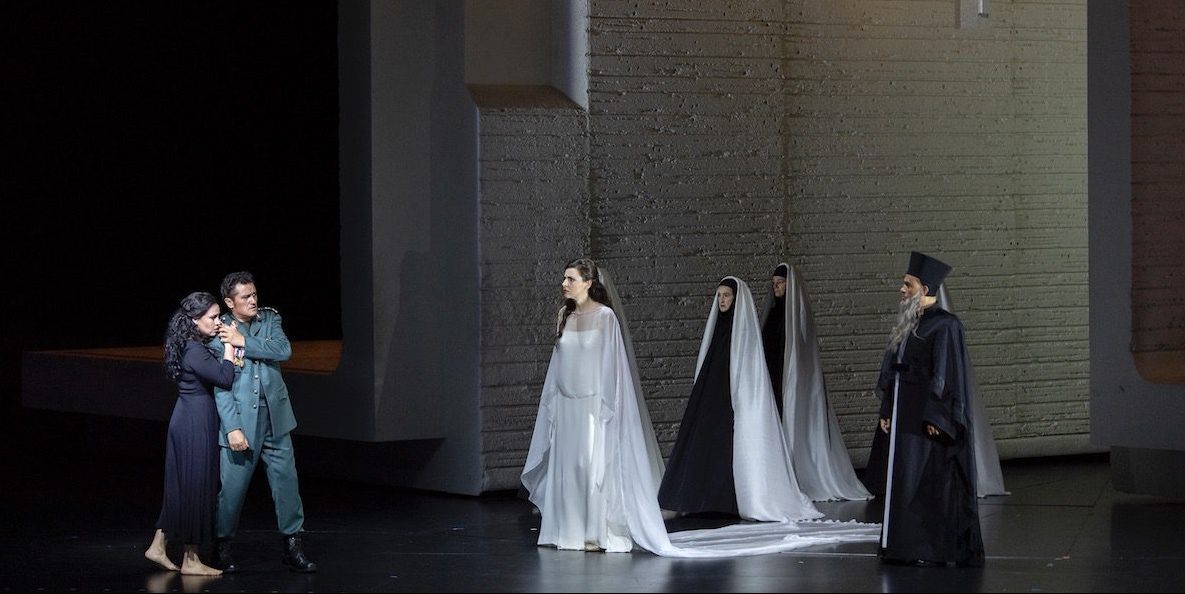Shirin Neshat directed Aida at Salzburg Festival five years ago and it was reviewed here. It was her first experience as a director and, apart from some reference to the Middle East, she focused mainly on the opera plot. In this revised revival for 2022 Summer Salzburg Festival, she dares much more.
The staging concept is the same, made with stylised functional blocks inspired by the architecture of the Middle East, which combine according to the scene in order to convey an impression of power or oppression or sacredness.
But the similarities end here. In her earlier version she held back on her work as visual artist. This reworked production, on the contrary, shows plenty of her video artistry, talent as a photographer and even her trademark calligraphy on skin, which helps to set the mood and enhances our understanding of the director’s reading of Aida.
Neshat focuses on the themes of the exile and gender segregation: they touch a personal chord for her as an exiled woman from Iran living in a foreign country. In Aida’s case, she sees a prisoner woman that can’t integrate in the culture of Egypt but at the same time she is not at ease with the request from her father because she is in love with an Egyptian. This dichotomy is her leitmotif that can be solved only with death. But there are plenty of other valuable ideas throughout the performance. The military power is portrayed as a dictatorial junta that overthrows the wills of the King and the people: in the second act all the slaves are killed on the spot despite Radamès pleading for their freedom. The soldiers also threaten the King’s daughter Amneris, who as a woman must submit to the men’s will. Religion is viewed as another tool to exercise power: this is one of the core Verdi’s themes and is powerfully rendered here by the cohort of ruthless and impassive priests.
But there is also an idea that seems to me pointless and counter-productive. Amonasro is killed with the other slaves so in the third act he speaks as a ghost to his daughter Aida: that makes the rest of the plot incomprehensible. It also gainsays the problem of what Aida must feel having seen her father murdered by the Egyptians and how she would react to that.
Traditionally this opera is sung by big voices and with lot of emphasis. It is not the case here where everything is stylised, intimate and slightly subdued.
The splendid Elena Stikhina brings an elegiac quality to the role of Aida: her suffering is never screamed but always expressed within the lines of her beautiful cantabile almost with resignation.
Ève-Maud Hubeaux, who stepped in during rehearsals for an indisposed Anita Rachvelishvili, interprets correctly the role of Amneris. However, she lacks power, especially in the low register, and doesn’t impress as a fearsome potential queen.
Luca Salsi in the role of Amonasro is empathetic and convincing.
Piotr Beczala’s debut as Radamès is the highlight of the evening. Far away from the conceited traditional interpretations, he paints a nuanced and touching picture of the passionate hero. He also accepts his destiny with resignation. After all, he is just a cog in a bigger scheme. He also makes the excellent choice to end the famous aria “Celeste Aida” with a pianissimo, as Verdi intended.
Alain Altinoglu conducts the Vienna Philharmonic with slow tempi and attention to the musical phrases. Unfortunately, that doesn’t make up for an unbalanced execution. Often, in the first two acts, the orchestra is unleashed to its full power, overwhelming the singers and clashing with the toned down mood of the performance.
Overall, this is a stylish and thought-provoking production that is ultimately worth seeing even if it is somewhat problematic in its conception.

